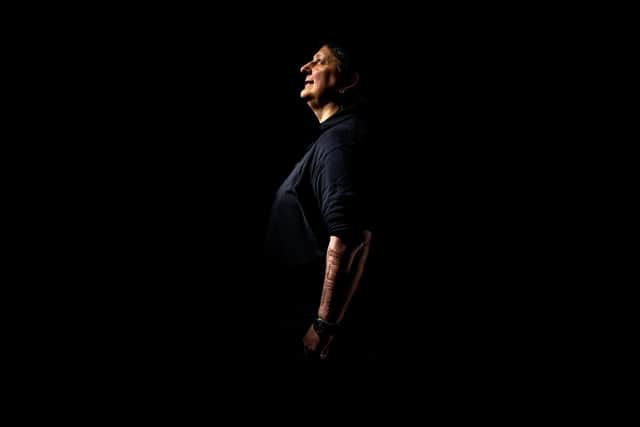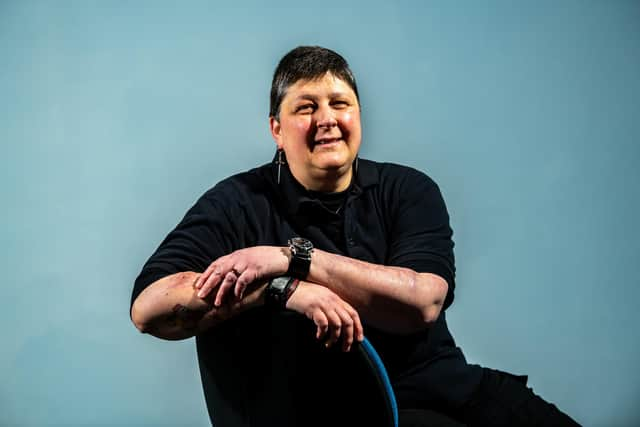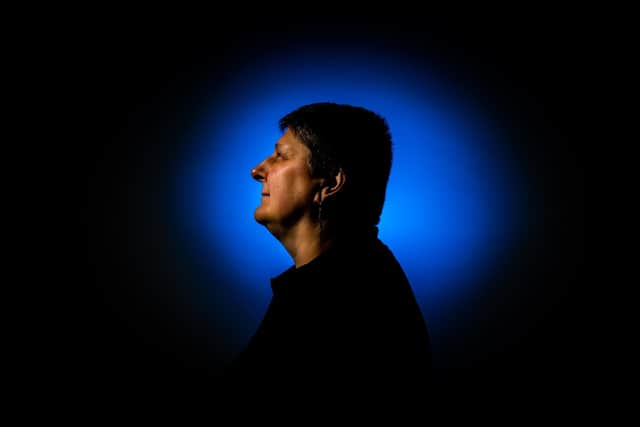Battle Scars: Leeds survivor-led charity helping people who self-harm
Jenny Groves was not even aware of the term ‘self-harm’ for a long time, despite doing it to herself. It was something she kept secret for 30 years, but now she runs Battle Scars, a Leeds-based charity helping people affected by it.
The organisation also offers support to the families and carers of those who hurt themselves, as well as to professionals.
Advertisement
Hide AdAdvertisement
Hide AdIn Jenny’s case, she started to hurt herself aged 13 as a “way to regulate” intense emotions.


She adds: “I didn't know until I was about 45 that I was autistic. So quite intense emotions were really difficult to deal with. I didn't know how to handle them. I didn't know how to calm myself down. I didn't know how to talk about them. I was finding that really difficult and self-harm appeared as an idea.
“I didn't know anybody who self-harmed, I didn't know it had word, that there was a term for it, until like 25 years later. It was something that I pretty much came upon,” she says.
It was, she explains, “my way to be in control of what I was experiencing, how I was going to bring it down, and without having to explain about it. I didn't have to put it into words because that was one of the biggest problems - I didn't know how to put this stuff into words.”
Advertisement
Hide AdAdvertisement
Hide AdJenny has self-harmed in a number of ways but the key thing, she stresses, is that it is all about control.


About eight years ago she made what she considers a bad decision to “suddenly quit”.
However, she found upport services “really basic and patronising, and in some ways kind of insulting”. Going on medication, meanwhile, “just made everything 10 times worse,” she says.
Ultimately, she returned to self-harming, but from these experiences set up Battle Scars.
Advertisement
Hide AdAdvertisement
Hide AdShe says: "I needed support and I decided I was going to go look for it. It was quite interesting because I found out so many people were affected by self harm, which I hadn't realised. And then it was more like, okay, how can we help these people? What can we do? How can we bring them together? How can we all kind of start helping each other? And then it just started growing.”


Battle Scars became a registered charity in February 2018. It is “survivor-led” and operates using a peer support model, offering training, advice and group sessions for various ages run by people who have experience of self-harm. It won in the Health and Wellbeing category at the 2021/22 Leeds Compassionate City Awards.
The organisation, though, is not necessarily about preventing people from self-harming – they believe the issue is far more complex than just telling people to stop, which could itself be counter-productive.
Jenny, 52, says: “Stopping self-harm is really difficult. And the only way to get to it is to learn healthier ways to manage whatever it is we're experiencing.
Advertisement
Hide AdAdvertisement
Hide Ad"So we’re focus in on the management of self-harm. Once we learn to manage triggers, manage what we're feeling and how we're going to reduce the intensity of what we feel, how we're going to talk to somebody, how we're going to build a support network, we're learning skills for life.”
She adds: “Once we've got them (skills), self-harm can still be a tool in the toolbox, but it comes out less and less and less. And it might no longer be necessary at some point.”
Meanwhile, family groups allow relatives of those who self-harm to express themselves “because there's a lot of guilt, there's a lot of despair, a lot of fear,” says Jenny, while those injuring themselves help loved ones understand why they do it.
Jenny, a married mother of grown-up twins, adds: “One of the things that we hear quite often is: ‘My child had a good day and they're still self-harming, this doesn't make sense at all’.
Advertisement
Hide AdAdvertisement
Hide Ad"So no, it doesn't make sense but it's the extreme happiness, that person doesn't know how to manage it. They're not quite sure how that's going to come down. That uncertainty can be just too difficult for them to manage, or they might feel they don't deserve to feel happy, so they're going to bring it down.”
Jenny and the charity still contend with the assumption in society that self-harm is about young people physically hurting themselves, so the organisation’s definition is “any harm done to the body or mind, whether it's external or internal, or whether it has an immediate effect, short term effect or a long term effect”.
She says: “Anybody of any age could be self-harming. If we go with our broad definition, it works out that pretty much every single person will, or has already, self-harmed at some point in their life. Because we don’t look after ourselves, we overeat, we drink too much, we smoke, we sabotage opportunities, we put ourselves down. Pretty much everybody does these things.”
Advertisement
Hide AdAdvertisement
Hide AdThe charity is now moving into a new building, the Onward Mental Health Hub, in Millshaw Park Way, south Leeds.
Jenny hopes that it will be somewhere that peers can spend time free from judgement.
“If you think about it, there's a lot of people that we support who might be cutting themselves and might be cutting in areas that are a bit visible, and they have to wear long sleeved stuff all year round. Just the fact that they can come here and they can take that hoodie off, because nobody's going to stare, nobody's going to say anything, they can just relax and be themselves (is good). Even something as simple as that.”
What advice does she give to those concerned about someone they know?
Advertisement
Hide AdAdvertisement
Hide Ad“The simple advice that we give to everybody is: remember, it's about control. So if you're going to say something to that person, are you taking control away by saying that? And if yes, do you need to ask, or can you rephrase in a way so that they can remain in control?”
For more information, visit www.battle-scars-self-harm.org.uk
Comment Guidelines
National World encourages reader discussion on our stories. User feedback, insights and back-and-forth exchanges add a rich layer of context to reporting. Please review our Community Guidelines before commenting.